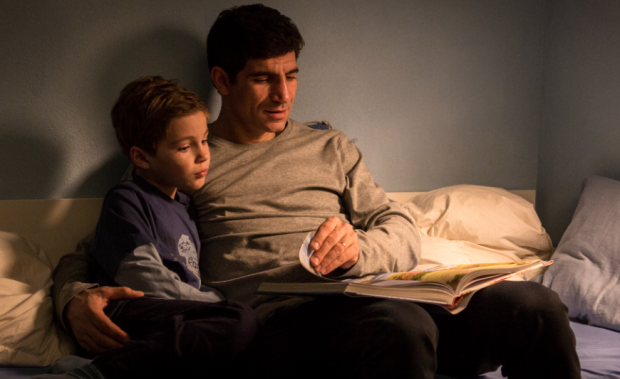
While Cannes, Toronto, and Venice premiere some of the year’s best films, no annual cinematic event is better curated than the New York Film Festival, which kicks off this weekend. Those attending will witness, over two weeks, some of the best features this year — and next — have to offer.
A simple copy-and-pasting of the line-up would suffice, but we’ve done our best to narrow it down to 25 selections that are the most worth your time. For honorable mentions, we’re looking forward to the stellar line-up of revivals, including The King of Comedy, All That Jazz, Blow Out, Rocco and His Brothers, Ran, Heaven Can Wait, and The Boys from Fengkuei.
We’ve also reviewed a few titles (The Forbidden Room, My Mother, Chevalier) that we were a bit cooler on. Lastly, the festival announced a sneak preview screening of Ridley Scott‘s The Martian, and one can read our review here.
Check out our favorites below and see our complete coverage over the next few weeks.
88:88 (Isiah Medina)
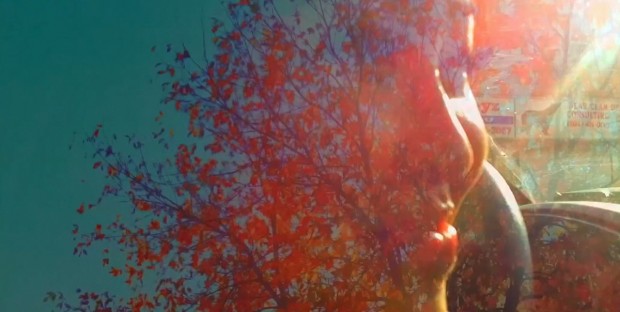
What has set cinema back — both from the perspective of those who make, and those who write about it — are the binaries chosen to be created and propagated, be it taste, modes of production, or genre, essentially what forms “correct” cinema, in terms either classical or experimental. So there’s more and more hope that a film can come along that hopefully defies the tradition of quality, that makes us rethink a medium only feeling more and more trivial with every passing day, even if it’s more accessible than ever. Amongst the many things that make 88:88 — the first feature from Isiah Medina, the 24-year-old Canadian filmmaker behind the shorts Semi-Auto Colors and Time is the Sun — so radical is its attempt to obliterate the binaries. – Ethan V. (full review)
Arabian Nights (Miguel Gomes)

Miguel Gomes’ Our Beloved Month of August and its ecstatically-received follow-up Tabu showcased the director’s love of storytelling as a means of contemplating reality. In these films, by whimsically intermingling and reinventing cinematic traditions as well as throwing in an abundance of personal innovations, Gomes wove tales that reflected on defining aspects of Portuguese culture with irresistible idiosyncrasy. The six-hour triptych Arabian Nights continues in the same vein, though with far greater ambition. Fascinating even in its misfires, this sprawling and fantastical document of the country’s plight in the wake of the global financial crisis confirms Gomes as one of the most exhilaratingly inventive filmmakers working today. – Giovanni M.C. (full review)
The Assassin (Hou Hsiao-Hsien)

The Cannes Film Festival represents the pantheon of arthouse cinema, so it does raise eyebrows when a wuxia movie is included in its official selection. After all, this is a genre known for superhuman speed and loud, physical forms of expression, stuff that fantasies are made of but not exactly traits one associates with fine arts. That’s until Taiwanese maestro Hou Hsiao-hsien came along to deliver his version of kung fu. The resulting The Assassin (translated from Nie Yinniang) turns out to be the quietest, most introspective and deliberately-paced film in competition, a feat so rare and radical it casually revolutionized decades of filmmaking tradition. – Zhuo-Ning S. (full review)
Brooklyn (John Crowley)
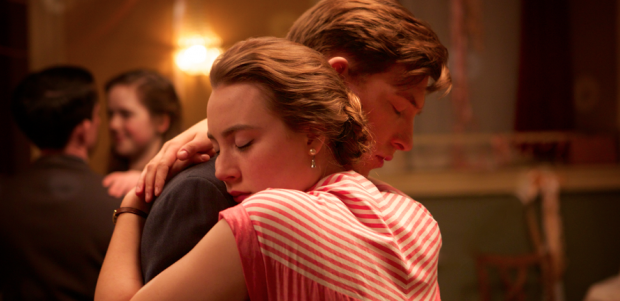
Presented with the tale of an Irish immigrant, one would perhaps expect a dreary and brutal film about the hardships of moving to America. In a way, John Crowley‘s Brooklyn is that movie, but, really, it’s so much more. While the Nick Hornby-scripted adaptation isn’t without its tough drama, Crowley’s picture is also full of kindness and laughs. In the 1950s, Eilis Lacey (Saoirse Ronan) is moving to America, thanks to her wonderful sister (Fiona Glascott). Eilis leaves her sister, mother, and the small shop she hates working at to go to Brooklyn, where a job and home has been set up for her. Initially, she’s isolated and alone in her new home. She’s not particularly good at her job and doesn’t get along well with her housemates. Her feelings towards the city soon change when she meets Tony (Emory Cohen), who’s basically a total dreamboat with no flaws to speak of. Tony quickly falls for Eilis, and even his Italian parents are smitten by her sweetness. Soon after she falls in love with America and Tony, tragedy strikes and she must return to her small Irish town. Ultimately she’ll have to choose between two homes and two men, the other suitor played by Domhnall Gleeson. – Jack G. (full review)
Bridge of Spies (Steven Spielberg)

Firmly entrenched in the Old Master stage of his career, Spielberg, America cinema’s preeminent historical storyteller, continues his run of epics with a career first: The Cold War. That decades-long conflict offers an almost endless amount of territories to explore, so consider me curious that he took interest in the legal battle to return a captured American pilot. Considerably adding to that interest is the screenwriting input of Joel and Ethan Coen — hopefully making more of an appearance than in their forgettable Gambit and Unbroken gigs. Some old-fashioned thrills and a peek behind the Iron Curtain will do just fine, but another Spielberg-Hanks pairing (to say nothing of the Spielberg-Kaminski union) has us expecting more than mere dramatization. – Nick N.
Carol (Todd Haynes)

To be an actress and land a leading role in a Todd Haynes film must be a dream come true. With Safe, Far From Heaven, and his five-part miniseries Mildred Pierce, Haynes has proven himself to be one of the very few male directors not only interested in but capable of endowing women protagonists with genuine and far-reaching complexity. In doing so, the performances he’s drawn from his actresses – Julianne Moore in the first two titles and Kate Winslet in the lattermost – have been amongst the very finest of their careers. These virtues are again masterfully exhibited in Carol, his sublime adaptation of Patricia Highsmith’s 1952 novel The Price of Salt. – Giovanni M.C. (full review)
Cemetery of Splendour (Apichatpong Weerasethakul)

If it is by now redundant to say that Thai filmmaker Apichatpong Weerasethakul (who understands pronunciation troubles and insists people call him “Joe”) is truly in a class of his own, we might blame both the general excellence of his output — a large oeuvre consisting of features, shorts, and installations — and the difficulty that’s often associated with describing them in either literal or opinion-based terms. The further one gets into his work, however, the more his marriage of dense visual style with Thailand’s historical, spiritual, and mystical bedrocks will cohere. These images —often set in nature (with billowing winds and shaking trees adding to the atmosphere); almost always composed in long shot that emphasizes a self-conscious artificiality; and frequently running a few minutes each, sometimes several, to create a laid-back rhythm— are, for viewers Thai and non-Thai alike, a gateway to less-definitive thematic undercurrents. To put this in different terms for neophytes: observing his art is not at all unlike the intellectual stimulation of, say, confidently working through passages of a dense 19th-century novel. On a piece-by-piece basis, Cemetery of Splendour is a bit more straightforward than Joe’s other work. – Nick N. (full review)
De Palma (Noah Baumbach and Jake Paltrow)

Earlier this year, Kent Jones’ Hitchcock /Truffaut — a documentary on the famous interview sessions between the two directors — boasted perhaps the most chaotic, dignity-threatening queue of any film screened at Cannes. There is a craving for this sort of thing among cinephiles it seems and it’s easy to see why. Directors just seem to open up much more when speaking to one of their own kind. Brian De Palma, the subject of this fine documentary, says that they’re “the only ones who understand what we go through.” Over the last five years, fellow directors Noah Baumbach and Jake Paltrow shot over 30 hours of interviews with the movie icon and have distilled them down into this rich feature-length documentary. De Palma is a fascinating, revealing and compelling overview of a remarkably eclectic career, but it’s also a seldom-heard first-hand account of what it’s like to work inside and outside the Hollywood system. – Rory O. (full review)
Experimenter (Michael Almereyda)
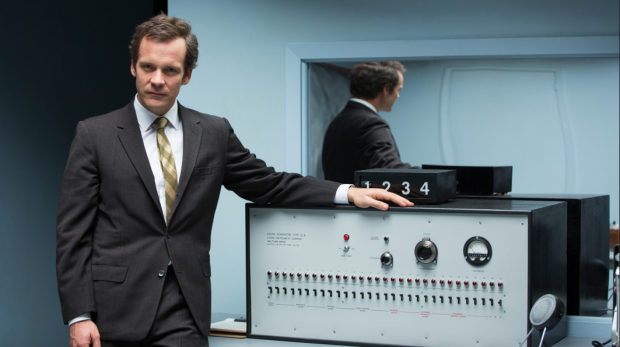
Ever since his divisive, modernized Hamlet, Michael Almereyda has been toiling away in something approaching obscurity. A dozen films later Experimenter has garnered a place in the New York Film Festival’s main slate, providing hope that he may come back to the mainstream (or something close to it). The film, a biopic of Stanley Milgram, for whom the “Milgram experiment,” in which a subject and a dummy participant are placed in separate rooms, with the subject giving the other person an escalating series of shocks for answering questions incorrectly, avoids the trappings of its genre. There are no easy answers, no epiphanies, no moments from the past that explain much of what we have seen. Instead, Almereyda lets Milgram, brilliantly portrayed by Peter Sarsgaard, address the camera directly and take us through time as his omniscience dictates. The filmmaking is thrilling, and its subject more so; the script repeatedly but casually finds the deeper implications of results and findings with which the audience may already be familiar. – Forrest C.
In the Shadow of Women (Philippe Garrel)
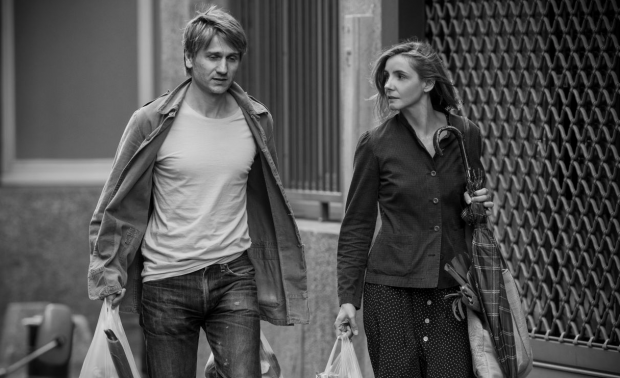
While fitting snugly in the overall cohesiveness of Philippe Garrel’s filmography, In the Shadow of Women nevertheless feels like a companion piece to its predecessor, the 2013 critical hit Jealousy. Garrel’s latest is also shot in black-and-white, kept within a similarly svelte running time (73 minutes), and its pared-down story of marital infidelity again takes the jealousy intrinsic to adult relationships as its primary theme. In the Shadow of Women revolves around Pierre (Stanislas Merhar) and Manon (Clotilde Courau), a married couple living in a run-down Parisian apartment and struggling along as documentary filmmakers. The strain in their relationship is apparent from the outset and both soon embark on individual affairs. The contrast in their respective motivations – Pierre’s is physical; Manon’s is emotional – and reactions upon learning of the other’s unfaithfulness – Manon is understanding; Pierre is seething – lays bare the asymmetries in their marriage, forcing a confrontation with truths hitherto swept under the carpet. – Giovanni M.C. (full review)
Ingrid Bergman – In Her Own Words (Stig Björkman)

A documentary that lives up to its title, Ingrid Bergman – In Her Own Words capitalizes on the star’s legendary career and unbelievable life by putting us inside her head, plumbing the actress’ diaries and personally shot home movies to create a kaleidoscopic psychological portrait. While structurally similar to most portrayals of a great actor, alternating between an examination of the career and home life — the overlap of this Venn Diagram is insane media coverage of her activity behind closed doors — insights provided by every party, from Bergman herself to her children to, surprisingly, stage co-star Sigourney Weaver, is probably sufficient for two documentaries. Stig Björkman keeps the material tight and propulsive, by film’s end encouraging us to rewatch her classics and look at those titles we still haven’t seen. – Nick N.
In Jackson Heights (Frederick Wiseman)

How amazing it is that a human being one century from now can fire up their wind-powered neuro-image-emitter, put on Frederick Wiseman’s In Jackson Heights, and really get a grasp of what it felt like for these people to live? The great documentarian’s latest film — screening out-of-competition this week at the Venice Film Festival — is neither a snapshot nor a love letter of some static environment, but a dense, kaleidoscopic study of a dynamic, evolving place. It’s like a time capsule of this community at a very interesting moment in their history. – Rory O. (full review)
Journey to the Shore (Kiyoshi Kurosawa)

A 40-year-old Japanese woman, Mizuki (Eri Fukatsu), begins to cook by herself, the audience assuming she’s a single career woman stuck in the middle of her daily grind, until a slight camera movement reveals Yusuke (Tadanobu Asano), her three-years-dead husband, who she greets with, disconcertingly, little surprise. This means we’re in the world of Kiyoshi Kurosawa, one with a casual supernatural presence. Yet if in the simple touch of Yasuke’s spirit not carrying a ghostly glow (consider one of the Jedi apparitions from Star Wars), Journey to the Shore barely functions as a genre picture. If anything, it’s far more akin to Tokyo Sonata than Cure or Pulse. – Ethan V. (full review)
Junun (Paul Thomas Anderson)

Clocking it at under an hour, Junun is easily the shortest film on this list, but it might be the most-anticipated. Only a year after premiering Inherent Vice at the New York Film Festival, Paul Thomas Anderson will return with this secret project filmed over the last year in northwest India. The documentary follows his trip with collaborator Jonny Greenwood as he records an album with Israeli composer Shye Ben Tzur and a wealth of talented international musicians. Judging from a few behind-the-scenes snaps, it looks to be a handheld, intimate project — a different side of PTA that we’re looking forward to. – Jordan R.
The Lobster (Yorgos Lanthimos)

The eminently idiosyncratic films of Yorgos Lanthimos revile the societal constructs that stifle and pervert human interaction. In laying bare these structures’ inherent hypocrisies, the films exaggerate their logic to absurd extremes, with conformity’s noxious ramifications always at the crux of Lanthimos’ critique. His exceptional breakthrough Dogtooth eviscerated the institution of the modern family, representing it as emblematic of society’s greater normative oppression. Dogtooth’s similarly incisive yet less warmly received follow-up Alps exposed the pretence fundamental to the forming of social identity. His newest film, The Lobster, takes on the rigid preconceptions surrounding relationships. – Giovanni M.C. (full review)
Microbe & Gasoline (Michel Gondry)

Following up Mood Indigo, Eternal Sunshine of the Spotless Mind director Michel Gondry recently debuted his latest film, Microbe & Gasoline, in France, and it will now be getting its U.S. debut at the New York Film Festival. The drama stars two young newcomers in the lead roles (Ange Dargent and Théophile Baquet), who are joined by Audrey Tatou (Amelie). The delightful-looking story follows the two boys who decide to build their own car and take a road trip across France without their parents. – Jordan R.
Miles Ahead (Don Cheadle)

Only appearing in five films in the last five years, actor Don Cheadle has been working on Miles Ahead, his Miles Davis biopic that he writes, directs, and stars in. It was initially known as a passion project, which even had the actor going to crowd-funding to help achieve certain period details. Now, the film is having its world premiere at the New York Film Festival, where distributors Sony Pictures Classics will feel out whether it’s worth releasing the same year as their Hank Williams biopic from director Marc Abraham (with Tom Hiddleston playing the country legend). The full immersion of Cheadle into this project is enough to drive up curiosity, especially considering his talents as an actor and in picking compelling stories. Look for this one towards the end of 2015 with awards buzz in tow or probably somewhere in the middle of 2016. – Nick A.
Mountains May Depart (Jia Zhangke)

Though vastly more moderate than its predecessor, the ultra-violent A Touch of Sin, Jia Zhangke’s Mountains May Depart continues the director’s move away from the extremely measured, observational style that characterized much of his earlier work. Even as his narratives have become more charged, however, Jia’s thematic focus has remained constant and Mountains May Depart offers his latest reflection on the momentous societal changes that have swept over China as a result of its entry and ascension in the globalized world economy. If A Touch of Sin expressed Jia’s rage at the contemporary impact of capitalist progress on Chinese society, Mountains May Depart is his lament over the direction in which it is headed. – Giovanni M.C. (full review)
Editor’s Note: Walter Salles‘ documentary Jia Zhangke, A Guy from Fenyang is also playing at the festival, and is certainly worthy of a recommendation.
My Golden Days (Arnaud Desplechin)

Following up his previous Cannes debut Jimmy P.: Psychotherapy of a Plains Indian, Arnaud Desplechin returned to the festival alongside his frequent collaborator Mathieu Amalric. Revisiting his character of Paul Dédalus, from 1996’s My Sex Life… or How I Got into an Argument, the story looks back at three periods in childhood and adolescence that shaped his life. It was one of the most well-received titles at Cannes; we unfortunately missed it there, so we’re looking forward to catching up before its 2016 release. – Jordan R.
No Home Movie (Chantal Akerman)

The presence of a mother is quite clear in Chantal Akerman’s best-known work, whether it be the one communicated back and forth to in News From Home or the titular Jeanne Dielman, a woman relegated to homemaker and cook for her son. Assuming the influence this woman has had on one of cinema’s most rigorous formalists and staunch feminists, making a film on her final years may conjure up a certain mental image, yet many will be surprised by the ensuing two hours. – Ethan V. (full review)
Right Now, Wrong Then (Hong Sang-soo)

Martin Scorsese made one of the first English-language (and one of the very first American) pushes for Hong Sang-soo by recording an introduction for the South Korean helmer’s fifth feature, Woman Is the Future of Man. The video is brief, but he amply described Hong’s perpetually mysterious, endlessly inventive eye and ear for narrative construction by quoting Manny Farber’s words on Alfred Hitchcock’s Rope: “Hong Sang-soo’s pictures unpeel like an orange.” These films are populated by familiar constructs — the two leads are often a man and a woman; the man is usually a narrow-minded dork who’s traveling through a new land and always uncomfortable, particularly within the vicinity of the woman he inevitably likes — and its scenes consist of everyday activity: drinking, walking, conversation — often ending as the man reveals himself a selfish, creepy, and / or pathetic dope — and, in his earlier films, lots of sex. In other words, they’d sound massively uninteresting if described on a point-by-point basis. But when his patient visual style and narrative form — one built on exclusion as much as inclusion — begin working their usual spell, it seems unquestionable that he’s one of our greatest living filmmakers. Right Now, Wrong Then is a terrific example of Hong’s talents, which means it also sounds massively uninteresting: visiting an unknown city to present a screening of his film, a director, Ham Cheon-soo (Jeong Jay-yeong) meets a woman, Yoon Hee-jeong (Kim Min-hee), who he immediately takes a liking to. – Nick N. (full review)
Son of Saul (László Nemes)
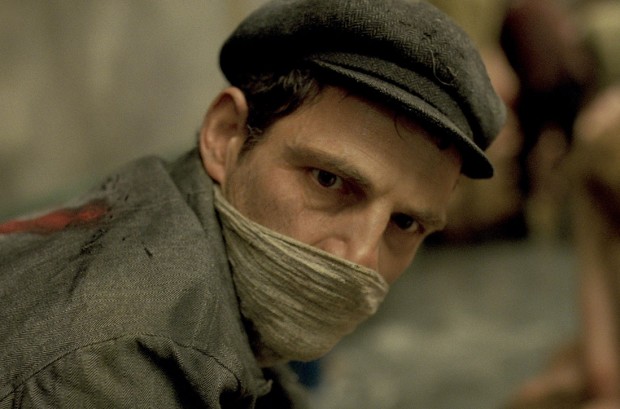
László Nemes‘ prodigious debut feature, Son of Saul, inhabits what Primo Levi called “The Gray Zone” in his essay of the same name: the reality of the Sonderkommando, concentration camp inmates who bought themselves improved chances of survival by operating the Nazis’ crematoria. In discussing these inmates’ choice, Levi warns the reader against casting judgment – this caution is addressed not only to those who never experienced the horror of the camps, but also to those who survived it. Levi argues that for the victims, the Holocaust had its own exceptional set of rules that applied differently to every individual. Consequently, the vital endeavor to understand genocide cannot discredit the experience of those who made such decisions within that system. Nemes, whether directly or not, took Levi’s advice to heart. By approaching his material through a purely experiential style that purposely eschews psychology, he has crafted a towering landmark for filmic fictionalizations of the Holocaust. – Giovanni M.C. (full review)
Steve Jobs (Danny Boyle)

Steve Jobs boasts a prestigious group of collaborators playing to their respective strengths. There’s director Danny Boyle, who, in 127 Hours, succeeded in creating a visceral portrait of one man. There’s the film’s star, Michael Fassbender who seems like a perfect choice to capture Jobs’ unique blend of ego and brilliance. Finally, there’s the film’s screenwriter, Aaron Sorkin, whose most celebrated film work came with 2010’s The Social Network. The drama, on paper, would seem like a return to the major themes and worlds of that wordy Sorkin-Facebook drama. How will these three distinct artists work together? Individually, it’s easy to speculate on their potential for Oscars. We’re hoping, however, that Boyle, Fassbender, and Sorkin have created a biopic as revolutionary as its titular character. – Zade C.
The Treasure (Corneliu Porumboiu)
Though regularly grouped with the directors that comprise the Romanian New Wave, Corneliu Porumboiu’s brand of social realism is all his own. Dispensing with the shaky cam so popular amongst his peers, his fictional features capture the world through contemplative long takes, their duration and frequent immobility allowing for careful observations of the subjects’ relationship to their environment, which is always reflective of wider-reaching concerns. The Treasure, his fifth feature and the winner of this year’s Un Certain Talent Prize, is the latest gem in the director’s exquisite filmography — another tightly focused, minimalist and enchantingly humane story of individual struggle within the broader social reality of contemporary Romania. – Giovanni M.C. (full review)
The Walk (Robert Zemeckis)

2012’s uniformly excellent Flight — well, “uniformly excellent” if we’re discounting music cues — showed that Robert Zemeckis hasn’t lost an ounce of his talent; if anything, the director seemed awakened from years and years in the motion-capture realm, more alive to the possibilities of the camera than ever before. The Walk may very well prove to be a special-effects showcase first and narrative / character piece second — his long history of toying with new tools is one thing; the IMAX 3D presentation confirms it’s being sold on this angle — and, boy, does Joseph Gordon-Levitt’s French accent raise some questions, but a formally muscular heist movie that climaxes with high-wire work? This is exactly what the Oscar-season rush could use. – Nick N.
What’s your most-anticipated film at NYFF?


